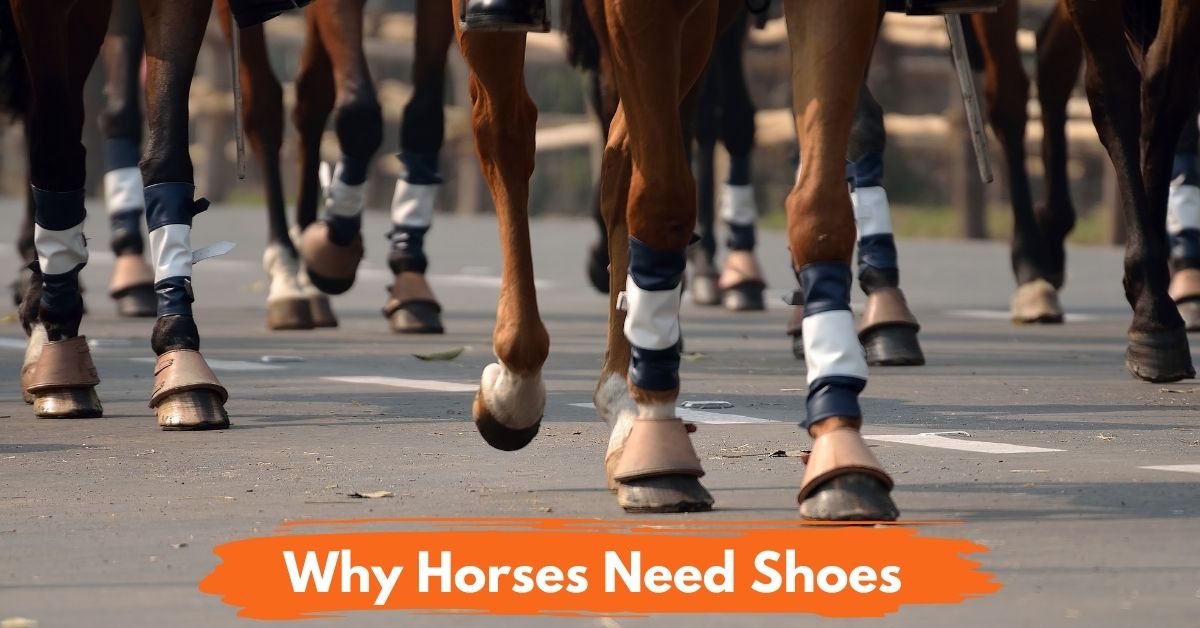
Have you ever grabbed a horseshoe and carried it? The first factor you’ll notice is how weighty it is! It’s hard to imagine that these objects made of steel are nailed on horses’ hooves, but it’s happening. Several horse breeds may be seen wearing horseshoes throughout the year, and this prompts the obvious question: why do horses need shoes?
Generally, your horse must be shoeless. However, there are some instances when horseshoes are required to provide additional support for your horse’s hooves. If you’re uncertain whether or not your horse requires shoes or how to managethem, read on to understand why horses need shoes and how to keep their hooves healthy.
Extra Protection
Horseshoes can protect the hooves of your horse. This will occur since the shoes would make their hooves more sturdy and tough. Many horses spend a significant period on rocky, harsh terrain, where shoes are advantageous. On certain surfaces, a barefoot horse might acquire bruising or sores.
The duration of this protection depends on the kind of shoes you choose.However, any material used to construct the shoes will safeguard the hooves.Today, metal shoes appear to be the most acceptable option.
If your horse remains in their stalls for extended periods, it will require shoes. Your horse is exposed to pee and other bodily fluids in the stalls. These factors will cause their hooves to become weak.
Although it will not completely stop the ammonia in their urine from entering their foot, it will provide considerable assistance.
Good Traction
While running, horses must keep good traction to keep themselves from sliding. This performance will be enhanced if your horse has shoes and will be more noticeable whenever your horse is on the racetrack. Also, traction will improve your horse’s other running abilities. If your horse competes in barrel races, it will have a firmer grip while turning.
Remember that there are several kinds of horseshoes. Therefore, the type of horseshoe you choose might alter your horse’s performance on the track or field. In addition to the riding abilities that come with grip, your horse will require shoes for pulling heavy loads. The shoes will provide your horse’s front foot with an improved grip.
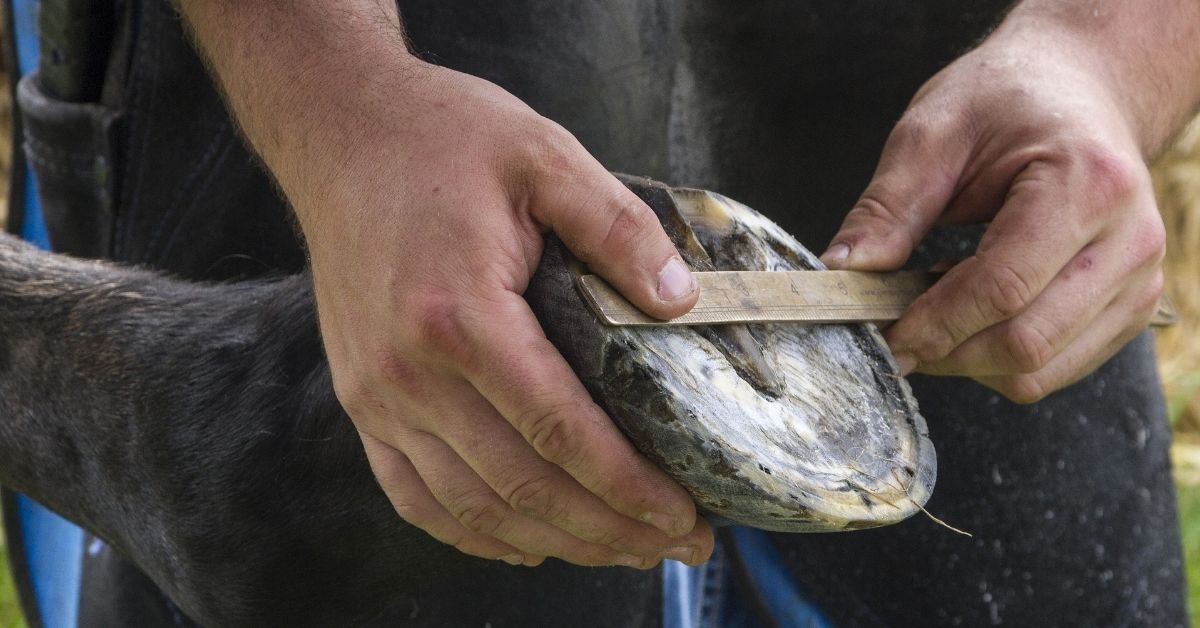
Proper Balance and Stance
Your horse will benefit from horseshoes if it struggles to achieve good stance and balance. Every horse can pull significant weight, run fast, and jump high. It just requires a suitable body gait.
Any qualified farrier or veterinarian would advise you that horseshoes provide balance. Consult a skilled farrier if you’re unsure which shoe to choose for your horse.
Additionally, a horse’s balance depends on its level of activity. The shoes for the competition differ from those required for standing in stalls.
Corrects The Feet
Any horseshoe can correct the form of your horse’s feet. Once its feet are correctly positioned, your horse can walk and run more efficiently. Remember, if your horse achieves balance, it will also develop superior riding techniques. Therefore, a poor foot will cause your horse to seem lame.
Any veterinarian or farrier will warn you that your horse’s foot might curl back if it’s not trimmed correctly. The issues will then spread to its entire body. Providing your horse with shoes can alleviate the problems associated with this trim.
Medical Purposes
If your horse suffers a medical issue on its feet, you must consider horseshoes as a possible treatment. Numerous illnesses and bodily conditions could harm the foot. Lameness is among the medical disorders affecting horses. The shoes will aid in mitigating this issue.
In addition, if your horse has corns or ringbone diseases, providing it with a horseshoe would be beneficial. Whenever the illness is in its early stage, you’ll see the shoes’ effects more quickly.
However, if a problem such as corn has spread further into the hooves, you must see a veterinarian before choosing shoes. After the effects of arthritis have diminished, the shoes will be beneficial.
Using the shoes, horses with injuries to their lower limbs may recover quickly. Each shoe will assist in evenly distributing pressure on the foot. Remember that your medical shoes would vary depending on the horse’s ailment. Specific shoes will not have the desired medical impact on your horse.
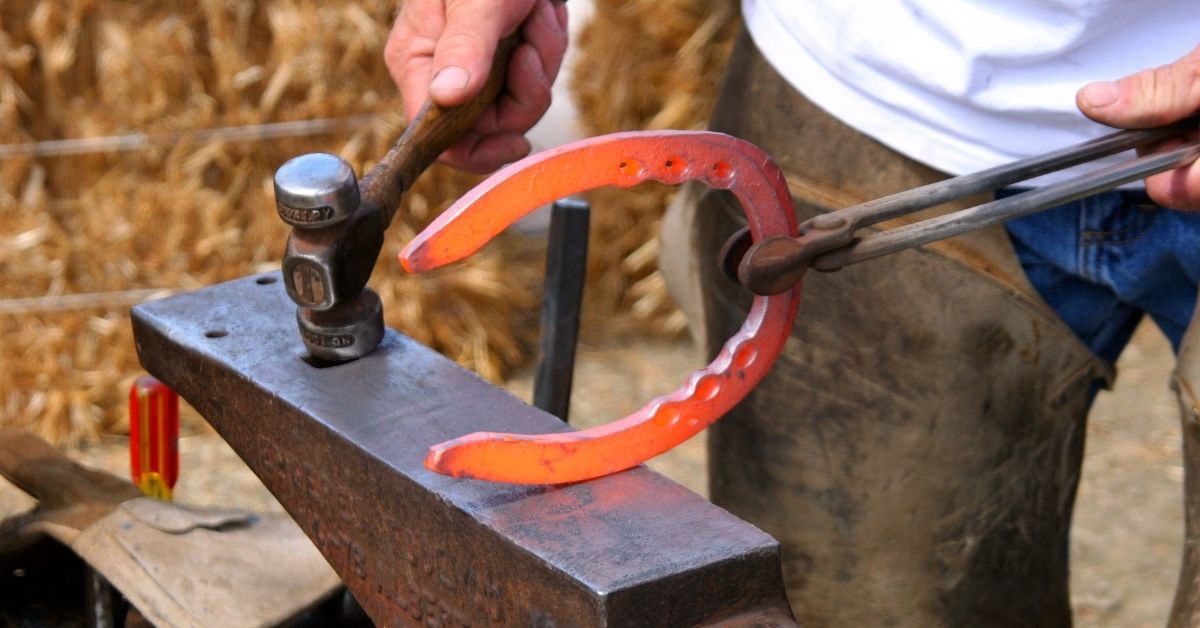
Improves Performance
A horseshoe can boost your horse’s performance not only on tasks but also in sports. You’ll notice this effect, particularly during horseracing activities requiring your horse to exert great strength.
These events include sprinting, high and long hops, and cross-country runs. Some horses could attain this level of leaping and landing ability without shoes. However, they’ll be exposed to several injuries throughout and after the activities.
Final Thoughts
Horseshoes enable most horses to perform various tasks more effectively and without injury. Also, you’ll have almost no difficulty handling them. To preserve their hooves, horses require shoes for various reasons. They gain stability and become physically fit for multiple activities.
Before choosing a horseshoe, consult a veterinarian or a farrier. From this point on, you can determine the shoe that suits your beloved horse for a particular activity.
FAQs
What Happens If You Don’t Shoe A Horse?
If you don’t shoe a horse, their hooves will wear out faster. This could lead to problems like:
- Joint pain.
- Lameness.
- Abnormal gait.
- Deformed hooves.
Plus, horses will be more prone to injuries without shoes. Especially if they work on the hard ground all day long.
This also applies if the horse often runs on muddy or sandy terrains. Or if the horse carries heavy loads such as carriages.
Not to mention…
You’ll also have to trim the horse’s hooves more often. Cause if not, your horse might face risks, such as:
- Sole bruising.
- Hoof abscesses.
- Fungal infections.
Now, trimming takes more time too. Though, it costs less than shoeing a horse.
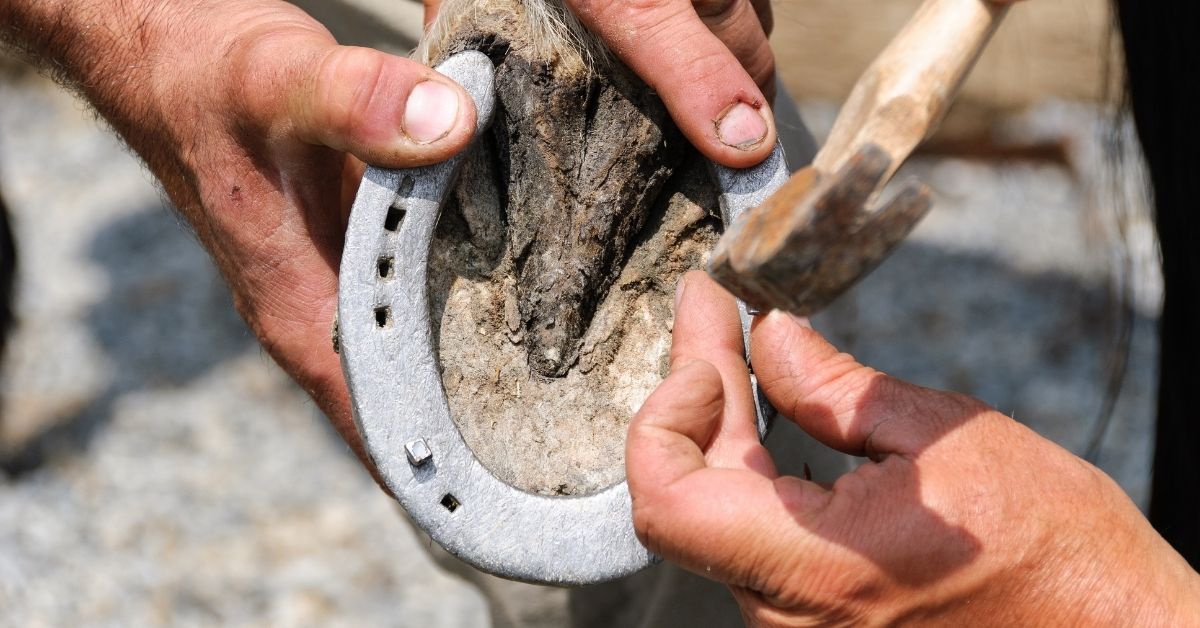
Do Horses Really Need Shoes?
Horses really need shoes, unless they live in the wild. That’s because domestic horses often do a lot of jobs.
And these jobs can cause the horse’s hooves to wear out. So, without shoes, horses are more prone to injuries.
However, this could change depending on the horse’s lifestyle.
For example, if the horse isn’t working any stressful job…
Then they won’t need the support of wearing shoes.
The same thing applies to horses that are:
- Strong and healthy.
- Working on soft and grassy terrains.
- Born with tougher soles, feet, and hooves.
Yes, these horses might not need to wear shoes.
But all in all, the average domestic horse needs shoes. Otherwise, they won’t function as best as they could.
Are Horses Better Off Without Shoes?
Horses aren’t better off without shoes. However, this only applies to domestic horses.
As explained earlier…
Wild horses can live without shoes. After all, they don’t do stressful jobs, like riding with humans. Or pulling loaded carriages.
Though, some domestic horses might prefer not wearing shoes.
That’s because steel shoes could increase the burden on a horse. That’s why unshod horses can run faster. Unlike horses that wear shoes.
So, in conclusion…
The need for shoes solely depends on the horse’s lifestyle.
Do Horses Like Getting Their Shoes Done?
Horses don’t like getting their shoes done. However, they’ll only tolerate it.
That’s why most horses don’t react much during the process of shoeing.
And that’s because horse hooves are made of keratin. That’s the same protein that makes up your hair and nails.
Now, when you get your nails trimmed…
The process doesn’t hurt you at all, right?
That’s because your nails don’t have nerve endings. And the same thing applies to horse hooves.
It means that horses don’t feel any pain when they get their shoes done.
That’s why most horses don’t mind the process of shoeing.
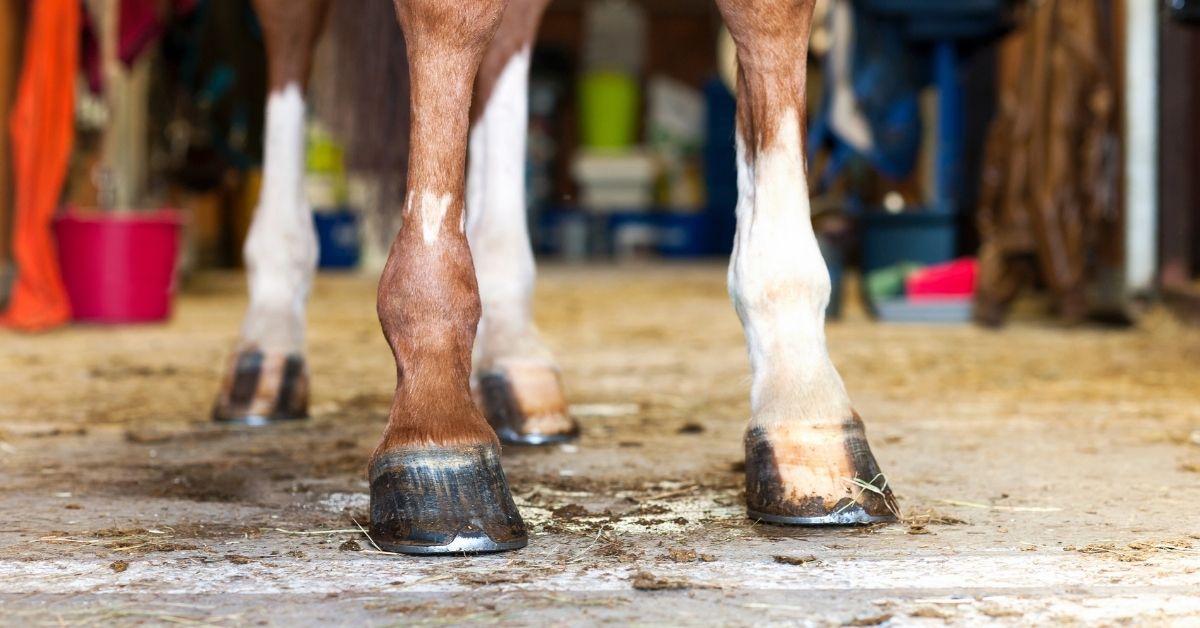
How Much Does It Cost To Shoe A Horse?
The cost to shoe a horse is dependent on the type of shoe you need, and how many horses you plan to shoe. A typical shoeing for a healthy horse will cost about $100-$200.
Do Horse Shoes Hurt Horses?
The short answer is: no, not when they’re done correctly.
Horses’ hooves are very thick and strong, and they’re designed to protect their feet from the hard ground they walk on every day. But they’re also sensitive to changes in their environment, like rocks or sharp objects that could cut into their sole if stepped on.
Why Do Wild Horses Not Need Horseshoes?
Wild horses are perfectly capable of surviving without horseshoes.
Horseshoes are designed to protect the hoof from wear and tear, but wild horses are not subject to the same types of environmental damage that domesticated horses are. They don’t stand in mud for hours at a time, for example, and they don’t live on concrete or asphalt. Their hooves aren’t worn down by constant contact with hard surfaces.
Why Do You Shoe A Horse But Not A Cow?
Horses need shoes because they spend so much time on their feet. Their hooves wear down, and the ground is hard and rough. The horse’s hoof is made of keratin, like our fingernails, which makes it harder than other animals’ hooves. If a horse didn’t have shoes, it would be more likely to get injured or develop arthritis.
Cows don’t need shoes for the same reason: they don’t put as much pressure on their hooves as horses do. Cows walk on soft grass or dirt most of the time, and they don’t run or jump as much as horses do. Their hooves are made of horn (like an antler), which is softer than keratin and protects them from damage better than keratin would protect a horse’s hoof.
How Long Do Horseshoes Last?
The lifespan of a horseshoe depends entirely on the kind of horse that wears it.
Some breeds have tough hooves and don’t need shoes at all, while other breeds require shoes to protect their hoof from wear and tear.
In general, regular shoeing will last anywhere between four and eight weeks; six weeks is the average with proper care and maintenance.
